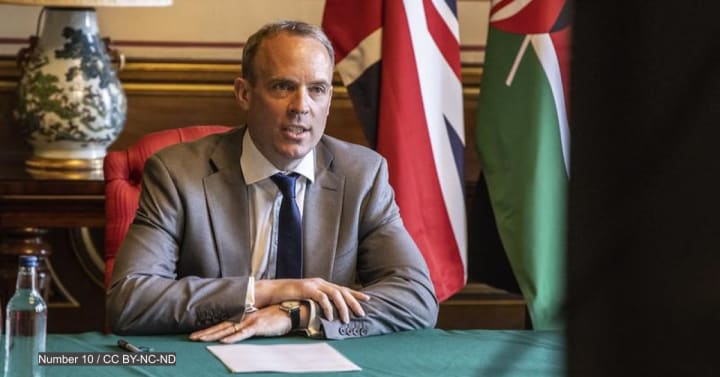
A highly awaited announcement on how the U.K. will spend its much-reduced foreign aid budget in 2021-22 has left the development sector with further questions, as economists deride it for being “evasive.”
Foreign Secretary Dominic Raab received criticism from across the political spectrum for the announcement, which was made late Wednesday afternoon through a written statement, instead of in Parliament.
The statement did not outline where deep cuts — affecting all areas of the development program — had been made from previous spending or how money would be spent beyond broad sector classifications, leaving NGOs with little information about the fate of their individual projects. The statement only discussed the Foreign, Commonwealth & Development Office’s £8.1 billion ($11.3 billion) budget and not that of other departments responsible for spending the remaining £2 billion of the fiscal year’s aid.
Raab wrote that the Indo-Pacific and South Asia region would receive a third of aid spending and Africa would get “around half” the budget but that there will be a “major shift to East Africa to reflect the UK’s unique role and clear national strategic interest.” He said aid to China would fall by 95%, to £900,000.
“These words hide the most draconian cuts ever made by Britain and they affect many countries where Britain has a deep and abiding relationship.”
— Andrew Mitchell, member of the U.K. ParliamentHe also repeated the government’s promise to return to spending 0.7% of national income on aid “when the fiscal situation allows” but gave no indication of when this would take effect. The smaller budget for 2021-22 is because of a government announcement in November that it would only spend 0.5% on aid because of economic difficulties.
“The way the data is presented is evasive,” said Mark Miller, director of the development and public finance program at the Overseas Development Institute. “It focuses on the numbers that are being provided, rather than the direction of travel, which is what governments are feeling at the moment.”
This was echoed by Ian Mitchell, senior policy fellow at the Center for Global Development, who said it “seems almost designed to make comparisons with last year difficult.” The most “frustrating” thing about that statement was that it “doesn’t make clear what has been prioritized,” he added.
Mitchell also said he was “really stunned” that only FCDO’s part of the aid budget was published, given that cross-government integration was said to be a key reason for the merger of the Department for International Development and the Foreign & Commonwealth Office last year. “It looks like strategic incoherence,” he said.
Observers told Devex they were also surprised by how little money went to areas the government has named as its priorities. For example, despite being a much-publicized government ambition and a personal priority for the prime minister, girls’ education was only allocated £400 million. Just £906 million was allocated to humanitarian spending, down from £1.5 billion in 2019, the last year for which statistics are available.
Supporting open societies and conflict resolution — highlighted as priorities in the recent Integrated Review of foreign policy — took a huge blow, receiving just £419 million. The government spent £1.3 billion on government and civil society in 2019.
Despite the COVID-19 pandemic — which experts are concerned is disproportionately affecting the world’s poorest — global health spending was also reduced, to £1.3 billion. The government spent £1.4 billion on global health in 2019, making it one of the relatively protected areas of spending.
Economic development and trade spending will take a severe hit, receiving £491 million compared with £1.2 billion in 2019 for economic infrastructure and services. FCDO will spend £534 million on climate change and biodiversity — though some climate spending will go through the Department for Business, Energy & Industrial Strategy — and invest £38 million in research and development in science and technology.
As FCDO lacks a development strategy, and existing bilateral programs are expected to bear the brunt of the aid cuts, little is known about how this money will be spent. Experts said they were unsure of what some categories of spending contained — such as “Financial transactions” — and pointed out that large payments to the European Union were omitted from the statement.
“These words hide the most draconian cuts ever made by Britain and they affect many countries where Britain has a deep and abiding relationship,” said Andrew Mitchell, a Conservative member of Parliament and former secretary of state for international development. Tobias Ellwood, chair of the Defence Committee, described it as “a grave mistake and not in the spirit of ‘Global Britain.’”
“To say the statement is scant on detail is an understatement,” said Labour’s Sarah Champion, chair of the International Development Committee of MPs. “Whilst we now have limited understanding on the areas the Government is prioritising for its shrinking aid pot, we are still awaiting guidance on country-by-country allocations. People’s lives are directly impacted by these decisions and it is shocking that they still don’t have clarity they need.”
A joint statement by major NGOs including Save the Children UK, CARE International UK, and The HALO Trust said the announcement was a “tragic blow” for the world’s poorest and “for the UK's reputation as a trusted development partner.”




